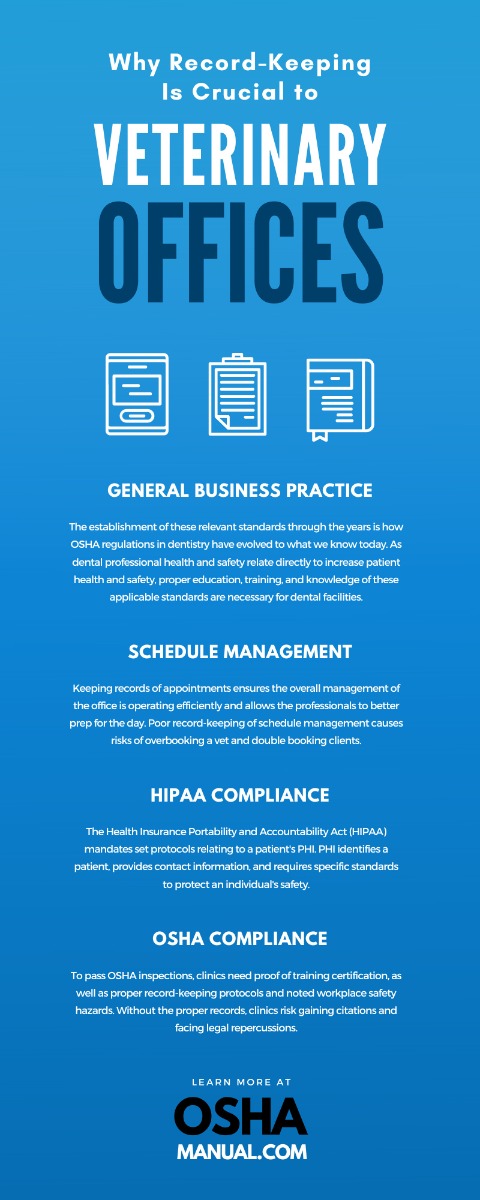
In most people's eyes, pet clinics simply function as a place to nurture, treat, and tend to animals. However, behind the curtains, veterinary offices operate like any other business. They follow a business plan for future growth, market their clinic and services to gain a steady income stream, provide quality customer service to maintain retention rates, and operate on the law of supply and demand. One of the essential practices of any business is record keeping. There are numerous reasons why record-keeping plays a key role in a veterinary office's success.
What Important Records Should a Veterinary Clinic Keep?
Like any business, veterinary offices track and accumulate a range of data. They manage information pertaining to general business records to more industry-specific data like medicinal supplies. Here are some of the types of records veterinary clinics need to keep:
- • Training certifications
- • Business licenses
- • Property records
- • Patient health information
- • Expenses
- • Tax records
- • Supply overview
- • Equipment overview
- • Appointments
- • Citations
- • Employment and staff records
- • Audits
The data collected, recorded, and kept helps oversee various aspects of a clinic's management and operation. From behind-the-scenes actions to the animals themselves, veterinary records cover everyone and everything that plays a part in the clinic.
The Importance of Record-Keeping
Record-keeping plays a crucial part in operating a veterinary office. Not only is adequate record keeping a general practice, but, at times, it is also a legal requirement.
General Business Practice
Tax information, expense history, supply and equipment overview, licenses, property information, and employment records are all part of a general business practice protocol. Collecting tax information helps make filing taxes the following year easier and covers the expenses the government or the business owes to one another. Failing to provide accurate tax information leads to serious legal reprimands like being charged penalties and fines, revoked licenses, and potential jail time (especially if found guilty of fraudulent information).
Supply and equipment overview and expense records help with the management side of operations. It determines whether future purchases need to be made, potential write-offs, and the number of patients they can cater to and aid. Knowing how much equipment, medicine, and general supplies are left in the clinic's inventory prevents supply shortages and other critical management mishaps.
Growth Trajectory
Various of the recorded data collected and kept by the clinic help track its growth history and trajectory. Numerous records can show proof of growth from patient headcounts, retention rates, successful treatments, and income earnings. Knowing the track of growth also determines future plans and decisions. Records showing an increase in patient intake could lead to potential plans of investing in more equipment and supplies, hiring more professionals, and broadening their services to meet the demands of clients.
Schedule Management
Keeping records of appointments ensures the overall management of the office is operating efficiently and allows the professionals to better prep for the day. Poor record-keeping of schedule management causes risks of overbooking a vet and double booking clients. It also creates a domino effect, affecting other parts of the office's operations like supply management, in-house accommodation availability, available workrooms, and staff members' schedules.
Property Management
Like with many collected information, records on property management play a crucial role in determining future decisions. Property records include maintenance requests, cited potential building hazards, building upgrades, and all the following expenses tied to property management. Recorded unattended maintenance requests help staff produce follow-ups and hold liability on those in charge of providing solutions. Cited hazards lead to implemented safety protocols, protecting staff and patients, and adhering to compliance with the Occupational Safety and Hazard Administration (OSHA). And records of the property's overview help the office determine potential upgrade plans like redesigned interiors, added office and ER spaces, and larger waiting rooms.
General Veterinary Medical Practice
Sufficient record-keeping is one of the many general protocols of operating a veterinary medical practice. Collecting data on patient health information, medicinal supplies, medical tools used, and proper dress code implementations are all practices that are essential to running a successful medical clinic. Not only are they basic requirements to continue operating a medical office, but they also comply with legal demands.
Patient History
Patient health information covers a range of sensitive and important information, ranging from an individual's contact and identification information to noted allergies, symptoms, and past procedures that affect future treatments. A lack of recorded patient history and information creates potential risk hazards. Without allergen intel, vets can accidentally prescribe treatment that'll cause even more issues to one's pet and even put the animal's life in danger.
OSHA Compliance
OSHA compliance is a federal requirement. OSHA oversees and sets the standards for workplace health and safety. They cover various types of hazards, from chemical and disease exposure to building dangers and proper workplace communication. The first step of OSHA compliance is undergoing veterinary OSHA training. At the end of the training, clinics receive certification and move on to a site evaluation. To pass OSHA inspections, clinics need proof of training certification, as well as proper record-keeping protocols and noted workplace safety hazards. Without the proper records, clinics risk gaining citations and facing legal repercussions.
Different Record-Keeping Methods and Tips
There are numerous tools and tips to ensure optimized and maximized record-keeping practices as a veterinary office. Some record-keeping methods include:
- Record-keeping software programs
- Using eligible handwriting or typing out important information
- Following generic medical record templates such as SOAPElectronic record-keeping practices
- Subject observations and commentary
- Objective data and statistics
- Comparative assessment and results
- Action plan
- Assigning a specific job to manage record information
- Adding times, dates, and signatures (of who took down the information) on each record
A key to keeping records intact and comprehensible is implementing an organized filing system or a single method of record-keeping throughout the office. If everyone follows the same protocols, it is easier to track and follow the collected information.
Record-keeping is an important attribute of a veterinary office's operations, safety, and legality. As a clinic, implementing and following set record-keeping guidelines minimizes mishaps and ensures the success of your business.


